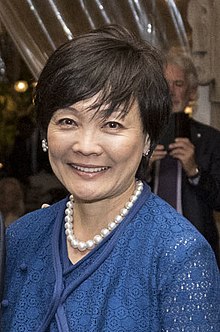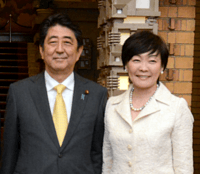Akie Abe
Akie Abe (安倍 昭恵, Abe Akie, born 10 June 1962) is the current First Lady of Japan and the wife of Shinzō Abe, the current Prime Minister of Japan.
Akie Abe | |
|---|---|
安倍 昭恵 | |
 Abe in 2017 | |
| Spouse of the Prime Minister of Japan | |
| Assumed office 26 December 2012 | |
| Monarch | Akihito Naruhito |
| Prime Minister | Shinzō Abe |
| Preceded by | Hitomi Noda |
| In office 26 September 2006 – 26 September 2007 | |
| Monarch | Akihito |
| Prime Minister | Shinzō Abe |
| Preceded by | Chieko Mori |
| Succeeded by | Kiyoko Fukuda |
| Personal details | |
| Born | Akie Matsuzaki (松崎昭恵) 10 June 1962 Tokyo, Japan |
| Political party | Liberal Democratic Party of Japan |
| Spouse(s) | Shinzō Abe |
| Residence | Shimonoseki, Japan |
| Alma mater | Sacred Heart Professional Training College Rikkyo University |
| Occupation | Housewife Radio disc jockey |
Overviews
Life
.jpg)
Born Akie Matsuzaki (松崎 昭恵, Matsuzaki Akie), Akie is regarded as a socialite. She is from a wealthy Japanese family; her father is the former president of Morinaga & Co., one of Japan's largest confectionery companies.
She was educated at Sacred Heart School in Tokyo (or Seishin Joshi Gakuin), a Roman Catholic private elementary through high school, then graduated from Sacred Heart Professional Training College. Abe later worked for Dentsu Inc., the world's largest advertising agency, before marrying Shinzo Abe in 1987. The couple have no children, having undergone unsuccessful fertility treatments earlier in their marriage.[1]
In the late 1990s, Abe worked as a radio disc jockey in her husband's hometown of Shimonoseki. She was popular in the broadcast area and was known by her jockey name, "Akky".[2]
Following her husband's first stint as prime minister, she opened an organic izakaya in the Kanda district of Tokyo, but was not active in management due to the urging of her mother-in-law.[3] She received a master's degree in Social Design Studies from Rikkyo University in March 2011.
As wife of Prime Minister

Akie became popularly known as the "domestic opposition party" due to her outspoken views, which often contradicted her husband's.[3] Abe is also known as a supporter of sexual minorities and the LGBT community. On April 27, 2014, she joined the gay pride parade in Tokyo to show her support for broader rights to Japan's LGBT community.[4] In 2015, she was photographed standing in a field of cannabis plants promoting the revival of the cannabis culture in Japan.[5]
While her husband was in office, Abe developed a close relationship with the Moritomo Gakuen kindergarten in Osaka, which is noted for its conservative and militarist culture, including requiring students to memorize the Imperial Rescript on Education. Abe was named as honorary principal of Mizuho no Kuni, an elementary school under development by Moritomo Gakuen, but resigned in February 2017 after it was discovered that Moritomo Gakuen had purchased the land for the school from the government for 14% of its appraised value.[6] The Moritomo Gakuen scandal highlighted the complicated role of the prime minister's wife in Japan: although Abe herself was not considered a civil servant, she was supported by a staff of five civil servants seconded from the Ministry of Foreign Affairs and the Ministry of Economy, Trade and Industry, thus implying that her role carries public duties.[7]
Abe was the first spouse of a Japanese prime minister to actively use social media, and was particularly personally active on Facebook and Instagram, but dramatically reduced her social media activities and changed the style of her posts in the wake of the Moritomo Gakuen scandal.[8]
References
- "Japan PM's wife in rare interview". BBC News. October 12, 2006. Retrieved May 25, 2019.
- "Japan's First Lady-to-Be an Avid Korean Wave Fan". The Chosunlibo World. 5 September 2006. Retrieved 5 October 2018.
- "Akie Abe not afraid to speak her mind". Japan Today. 4 January 2014. Retrieved 15 January 2014.
- "Japan's first lady Akie Abe joins gay parade". The Straits Times. 27 April 2014. Retrieved 5 October 2018.
- Johann Hari, Japan, the place with the strangest drug debate in the world, Opendemocracy.net, 11 May 2018
- McCurry, Justin (2017-02-24). "Shinzo Abe and wife under pressure over ties to ultra-nationalist school". The Guardian. ISSN 0261-3077. Retrieved 2017-04-24.
- "The Abes caught in political quagmire". Sentaku. 2017-04-01. Retrieved 2017-04-24.
- "Akie Abe's social media silence creates questions". Mainichi Daily News. 2017-04-10. Retrieved 2017-04-24.